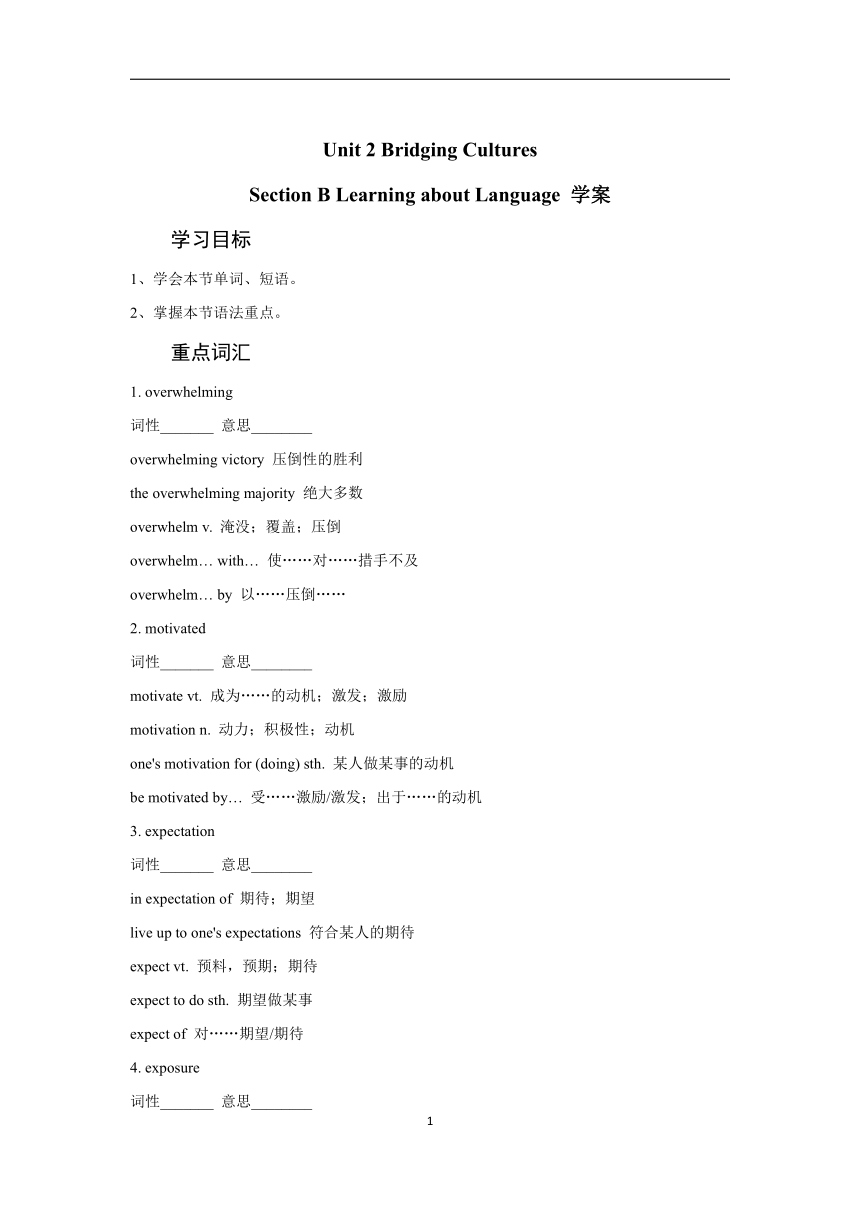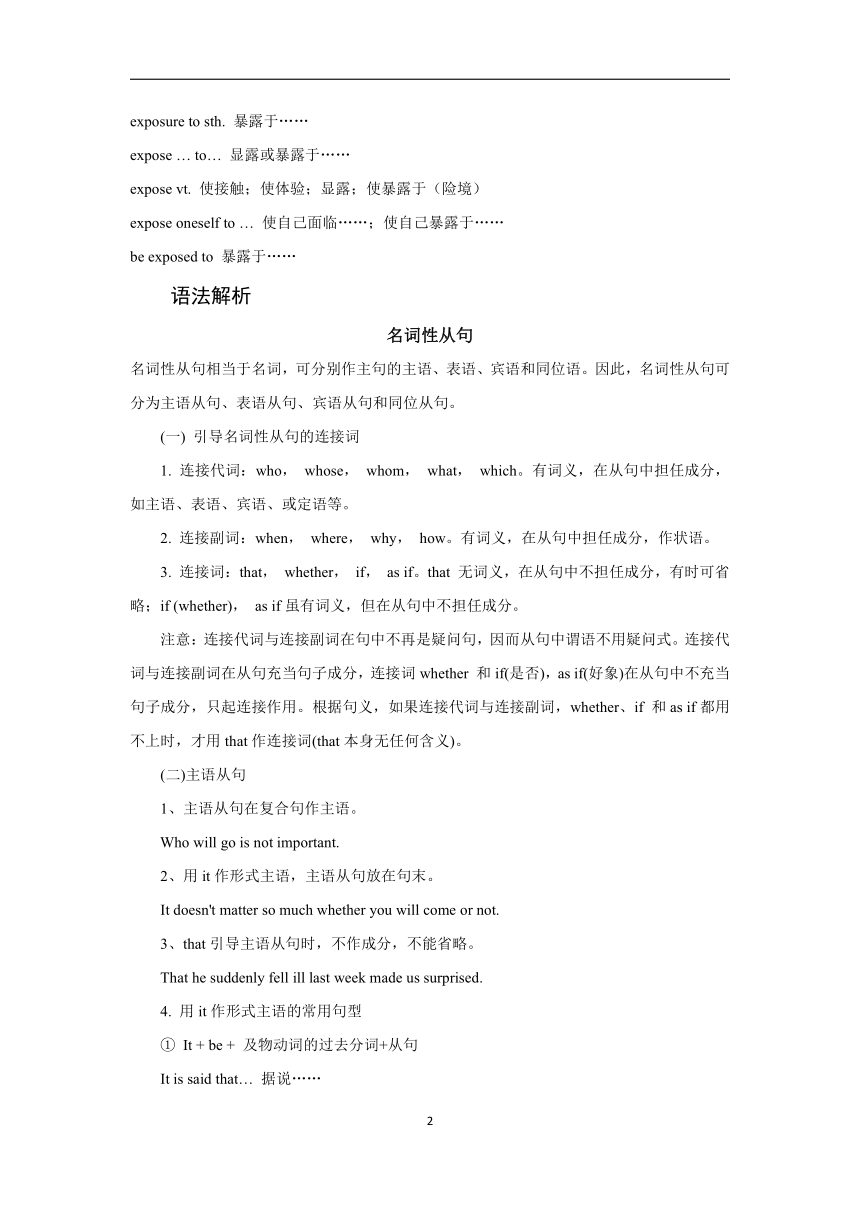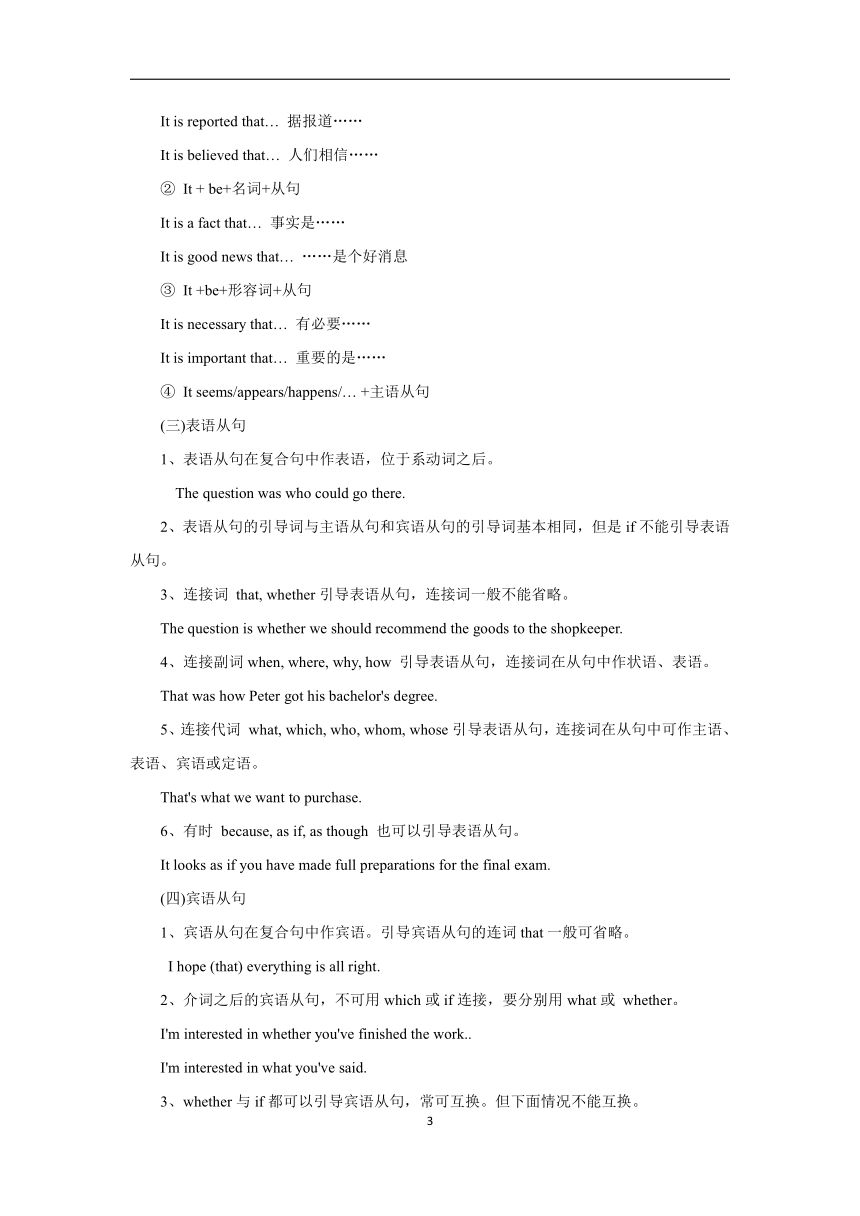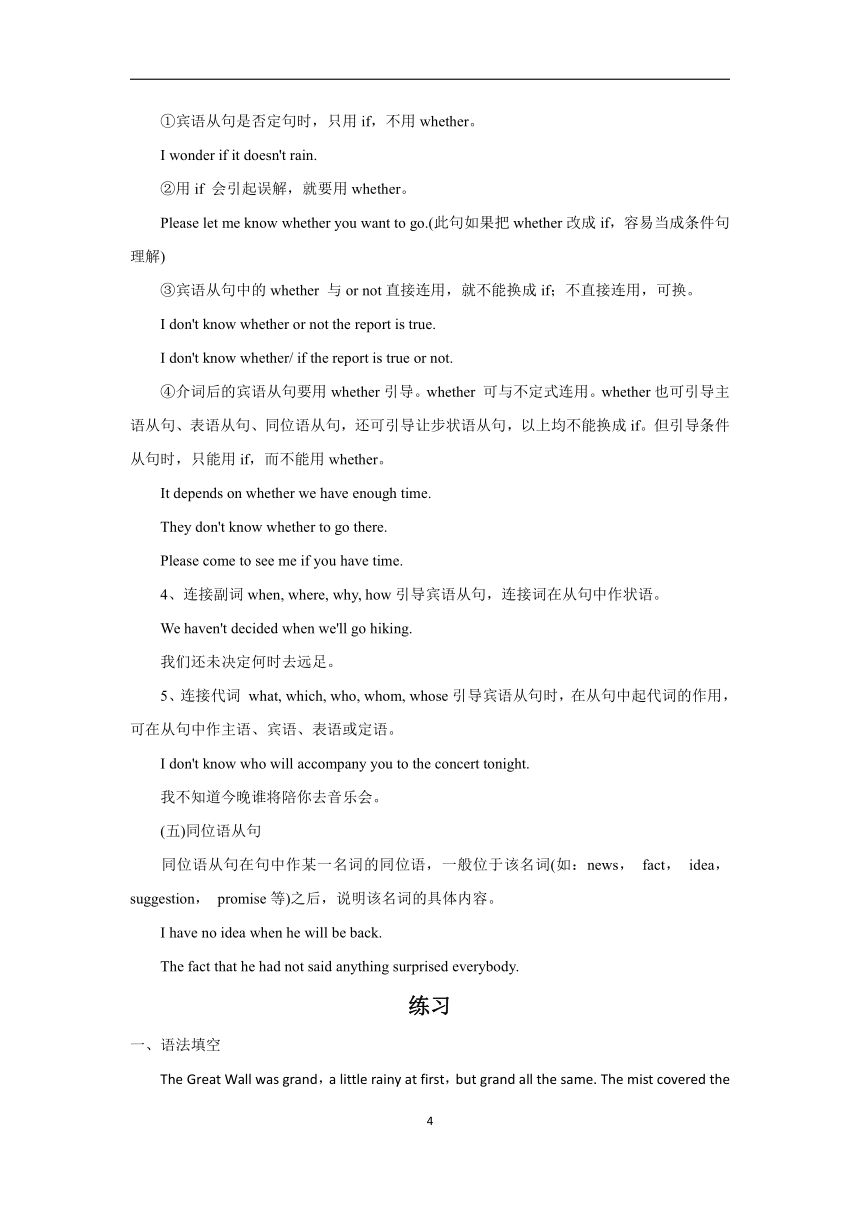人教版(2019)选择性必修第二册Unit 2 Bridging Cultures Section B Learning about Language学案(有答案)
文档属性
| 名称 | 人教版(2019)选择性必修第二册Unit 2 Bridging Cultures Section B Learning about Language学案(有答案) |  | |
| 格式 | docx | ||
| 文件大小 | 29.6KB | ||
| 资源类型 | 教案 | ||
| 版本资源 | 人教版(2019) | ||
| 科目 | 英语 | ||
| 更新时间 | 2022-11-15 16:31:09 | ||
图片预览




文档简介
Unit 2 Bridging Cultures
Section B Learning about Language 学案
学习目标
1、学会本节单词、短语。
2、掌握本节语法重点。
重点词汇
1. overwhelming
词性_______ 意思________
overwhelming victory 压倒性的胜利
the overwhelming majority 绝大多数
overwhelm v. 淹没;覆盖;压倒
overwhelm… with… 使……对……措手不及
overwhelm… by 以……压倒……
2. motivated
词性_______ 意思________
motivate vt. 成为……的动机;激发;激励
motivation n. 动力;积极性;动机
one's motivation for (doing) sth. 某人做某事的动机
be motivated by… 受……激励/激发;出于……的动机
3. expectation
词性_______ 意思________
in expectation of 期待;期望
live up to one's expectations 符合某人的期待
expect vt. 预料,预期;期待
expect to do sth. 期望做某事
expect of 对……期望/期待
4. exposure
词性_______ 意思________
exposure to sth. 暴露于……
expose … to… 显露或暴露于……
expose vt. 使接触;使体验;显露;使暴露于(险境)
expose oneself to … 使自己面临……;使自己暴露于……
be exposed to 暴露于……
语法解析
名词性从句
名词性从句相当于名词,可分别作主句的主语、表语、宾语和同位语。因此,名词性从句可分为主语从句、表语从句、宾语从句和同位从句。
(一) 引导名词性从句的连接词
1. 连接代词:who, whose, whom, what, which。有词义,在从句中担任成分,如主语、表语、宾语、或定语等。
2. 连接副词:when, where, why, how。有词义,在从句中担任成分,作状语。
3. 连接词:that, whether, if, as if。that 无词义,在从句中不担任成分,有时可省略;if (whether), as if虽有词义,但在从句中不担任成分。
注意:连接代词与连接副词在句中不再是疑问句,因而从句中谓语不用疑问式。连接代词与连接副词在从句充当句子成分,连接词whether 和if(是否),as if(好象)在从句中不充当句子成分,只起连接作用。根据句义,如果连接代词与连接副词,whether、if 和as if都用不上时,才用that作连接词(that本身无任何含义)。
(二)主语从句
1、主语从句在复合句作主语。
Who will go is not important.
2、用it作形式主语,主语从句放在句末。
It doesn't matter so much whether you will come or not.
3、that引导主语从句时,不作成分,不能省略。
That he suddenly fell ill last week made us surprised.
4. 用it作形式主语的常用句型
① It + be + 及物动词的过去分词+从句
It is said that… 据说……
It is reported that… 据报道……
It is believed that… 人们相信……
② It + be+名词+从句
It is a fact that… 事实是……
It is good news that… ……是个好消息
③ It +be+形容词+从句
It is necessary that… 有必要……
It is important that… 重要的是……
④ It seems/appears/happens/… +主语从句
(三)表语从句
1、表语从句在复合句中作表语,位于系动词之后。
The question was who could go there.
2、表语从句的引导词与主语从句和宾语从句的引导词基本相同,但是if不能引导表语从句。
3、连接词 that, whether引导表语从句,连接词一般不能省略。
The question is whether we should recommend the goods to the shopkeeper.
4、连接副词when, where, why, how 引导表语从句,连接词在从句中作状语、表语。
That was how Peter got his bachelor's degree.
5、连接代词 what, which, who, whom, whose引导表语从句,连接词在从句中可作主语、表语、宾语或定语。
That's what we want to purchase.
6、有时 because, as if, as though 也可以引导表语从句。
It looks as if you have made full preparations for the final exam.
(四)宾语从句
1、宾语从句在复合句中作宾语。引导宾语从句的连词that一般可省略。
I hope (that) everything is all right.
2、介词之后的宾语从句,不可用which或if连接,要分别用what或 whether。
I'm interested in whether you've finished the work..
I'm interested in what you've said.
3、whether与if都可以引导宾语从句,常可互换。但下面情况不能互换。
①宾语从句是否定句时,只用if,不用whether。
I wonder if it doesn't rain.
②用if 会引起误解,就要用whether。
Please let me know whether you want to go.(此句如果把whether改成if,容易当成条件句理解)
③宾语从句中的whether 与or not直接连用,就不能换成if;不直接连用,可换。
I don't know whether or not the report is true.
I don't know whether/ if the report is true or not.
④介词后的宾语从句要用whether引导。whether 可与不定式连用。whether也可引导主语从句、表语从句、同位语从句,还可引导让步状语从句,以上均不能换成if。但引导条件从句时,只能用if,而不能用whether。
It depends on whether we have enough time.
They don't know whether to go there.
Please come to see me if you have time.
4、连接副词when, where, why, how引导宾语从句,连接词在从句中作状语。
We haven't decided when we'll go hiking.
我们还未决定何时去远足。
5、连接代词 what, which, who, whom, whose引导宾语从句时,在从句中起代词的作用,可在从句中作主语、宾语、表语或定语。
I don't know who will accompany you to the concert tonight.
我不知道今晚谁将陪你去音乐会。
(五)同位语从句
同位语从句在句中作某一名词的同位语,一般位于该名词(如:news, fact, idea, suggestion, promise等)之后,说明该名词的具体内容。
I have no idea when he will be back.
The fact that he had not said anything surprised everybody.
练习
一、语法填空
The Great Wall was grand,a little rainy at first,but grand all the same. The mist covered the far end of the wall,_____1_____ (give) it an almost mysterious feeling. The fog rolled in and out of the high mountains,revealing new parts of the wall as _____2_____ (quick) as it covered them.I kept on walking,seeing watchtower after watchtower_____3_____ my way. To my _____4_____ (relieve) many people had decided today was not the best day _____5_____ (climb) the wall,and I was there with very few people. I walked for_____6_____seemed like miles. Then I saw just how long the wall I was standing on stretched for.
It was _____7_____ (end)!I walked and walked,but after every hill I climbed,there was another long stretch of wall. I eventually came to_____8_____long staircase. Later I found out that once it _____9_____ (call) “Chairman Mao's Challenge”. I accepted,and after climbing the hundred plus stairs to the peak,I had to admit that the Great Wall truly lives up to its reputation. So if I_____10_____ (have) another chance to travel to China,I would never hesitate to visit the Great Wall again.
二、完成句子
11.这件事很有可能已经在我们的论坛讨论过了。
________the matter has already been discussed on our forum.
12.特别令人惊叹的是印加人的干式石头搭砌的建造方法。
________ is the Inca’s dry stone method of building.
13.同样富有挑战性的是,学生可以有不同的课程表。
__________________is that students can have different class schedules.
14.人生最重要的不是钱。
___________ ___________ ___________ ___________ ___________in life isn’t money.
15.她显然很激动。
________ ________ ________that she was excited.
16.In my opinion,________________.
在我看来,他在会上说的话真令人吃惊。
17.她走上前来和我握手,真是太不可思议了。(it 作形式主语)
_________________she came up and shook my hand.
18.what引导主语从句
________________ was that I didn’t know how to get along with my roommates.
让我心烦的是我不知道如何与室友相处。
19.________the Incas’ dry stone method of building.
特别令人惊叹的是印加人的干式石头搭砌的建造方法。
20.最使我生气的是他居然毫无悔意。
________________ was his total lack of regret.
参考答案:
1.giving 2.quickly 3.on/along 4.relief 5.to climb 6.what 7.endless 8.a 9.was called 10.had
【分析】这是一篇记叙文。俗话说:“不到长城非好汉。”文章作者讲述了来中国旅游爬长城的经历和感想。
【详解】1.考查非谓语动词。句意:薄雾笼罩着墙的另一端,给人一种近乎神秘的感觉。分析句子可知,设空处及之后内容为状语,句子主语the mist和give为主谓关系,句中已有谓语covered,所以此处用现在分词作伴随状语。指“薄雾笼罩着长城远处,使它有一种神秘的感觉”,故填giving。
2.考查副词。句意:雾气在高山上进进出出,迅速地暴露出城墙的新部分。我继续往前走,沿途看到一座又一座瞭望塔填。此处运用了“as...as...”结构,中间应用形容词或副词的原形。修饰谓语动词covered,所以应该用副词。故填quickly。
3.考查介词。句意同上。此处指“一路上,沿途”,所以用介词on/along,故填on/along。
4.考查名词(固定搭配)。句意:让我松了一口气的是,很多人都认为今天不是爬长城的好日子,所以在当时只有我和很少的人在(爬长城)。“to one's+n.”是固定搭配,指“让人感到……的是”。动词relieve,意为“缓解”,其名词形式为relief,故填relief。
5.考查非谓语动词。句意同上。名词day由最高级修饰,后面跟不定式作后置定语。故填to climb。
6.考查连词。句意:我走了大约好几英里。介词for后面跟宾语从句,从句中缺少主语,且指事物,应用连接代词what。故填what。
7.考查形容词。句意:长城绵延不绝。分析句子可知,设空处要用形容词作表语。根据上文“Then I saw just how long the wall I was standing on stretched for.”(然后我看到我正站在上面的墙上绵延有多长。),此处指“长城绵延不绝”,用endless符合语境。故填endless。
8.考查冠词。句意:我终于来到了一段长长的楼梯。根据句意可知,此处表示泛指一段楼梯,所以用不定冠词,又long的发音是辅音音素开头,故填a。
9.考查动词的时态和语态。句意:后来我才知道这个地方被称为“毛主席的挑战”的地方。分析可知,设空处为从句的谓语动词,it与call之间是动宾关系,再根据时间状语once可知,本句应用一般过去时。故填was called。
10.考查虚拟语气。句意:所以如果我有机会再去中国,我会毫不犹豫地再去参观长城。根据句意,分析句子可知,本句运用虚拟语气,指与将故来事实相反的情况,if从句中谓语动词用一般过去时。所以填had。故填had。
11.It is likely that
【详解】考查固定句型。分析has been和意思可知,一般现在时,这里考查表示“很可能”对应的固定句型It is likely that,it是形式主语,that引导真正的主语从句。故填It is likely that。
12.What is particularly impressive
【详解】考查主语从句,形容词和副词。根据中文意思,句子缺少“特别令人惊叹”,根据后面的is可知,前面是一个主语从句,表示“令人惊叹的”用impressive,表示“特别”用副词particularly,这里用what作从句的主语,根据后面的is可知本句用一般现在时,故从句用谓语动词is,what置于句首首字母大写。故填What is particularly impressive。
13.What is also very challenging
【详解】考查主语从句。句子是描述一个事实,应用一般现在时,空处表示“同样富有挑战性的”,译为一个主语从句,“富有挑战性的”使用形容词challenging作表语,前面用副词very修饰,引导词在从句中作主语,应用what引导,be动词用is,故填What is also very challenging。
14. What is the most important
【详解】考查名词性从句和形容词最高级。根据空后的“in life isn’t money”可知设空处在句在中做主语,结合句意主语可以用名词性从句来表达;“最重要的”表达为形容词最高级the most important,在从句中作表语;根据句意及句中的 isn’t可知从句也应用一般现在时,所以设空处应填What is the most important,从句中连接代词what做主语。故答案为①What②is③the④most⑤important。
15. It was evident
【详解】考查固定句型和时态。表示“显然”应用it is/was evident that...这个固定句型,it为形式主语,that引导主语从句,结合“she was excited.”可知,此处使用一般过去时。故填①It②was③evident。
16.what he said at the meeting was really surprising
【详解】考查从句,时态和形容词。根据中英文提示,主语“他在会上说的话”用what引导主语从句,从句缺少主语,表示“……的(东西)”用连接词what引导从句,根据句意用一般过去时,at the meeting“在会议上”,从句作主语,谓语动词用单数was,表示事物的特征用ing形式形容词surprising“令人吃惊的”,really“真地”作状语,故填what he said at the meeting was really surprising。
17.It was amazing that
【详解】考查主语从句和时态。it 作形式主语,代替后面的主语从句。从句结构完整,不缺任何意义,需用只起连接词that。结合从句一般的时态,主句的谓语应用过去时,首字母大写。故答案为 It was amazing that。
18.What upset me
【详解】考查时态、主语从句和动词。根据句意可知,句子为主语从句,应用“what”引导从句,在从句中作主语,指事物,没有选择范围,“upset”意为“使心烦意乱”,动词词性,根据句中“was”可知,句子陈述的是过去发生的事,应用一般过去时,“upset”的过去式为“upset”,作谓语,“me”为人称代词宾格,意为“我”,作宾语,句首单词首字母大写,“What upset me”表示“让我心烦的”。故填What upset me。
19.What is particularly amazing is
【详解】考查主语从句。分析句子可知,句子表述的是客观事实,应用一般现在时;同时设空处应使用what引导的主语从句,在从句中作主语;表示“特别地”用particularly;表示“令人惊叹的”用amazing;设空处置于句首,开头单词首字母要大写。故填What is particularly amazing is。
20.What angered me most/What made me most angry
【详解】考查主语从句。空格后文中已出现句子动词was,主语需要翻译成不包含谓语动词的短语或者从句,分析中文句子可知,句子主语为最使我生气的,应当翻译成一个完整的句子在主句中做主语构成主语从句;“anger sb 使……生气”或者“make sb angry 使……生气”,根据句意,应当使用连接词what在从句中做主语;主语时态为过去时,故从句时态也使用过去时,故填What angered me most或What made me most angry。
2
Section B Learning about Language 学案
学习目标
1、学会本节单词、短语。
2、掌握本节语法重点。
重点词汇
1. overwhelming
词性_______ 意思________
overwhelming victory 压倒性的胜利
the overwhelming majority 绝大多数
overwhelm v. 淹没;覆盖;压倒
overwhelm… with… 使……对……措手不及
overwhelm… by 以……压倒……
2. motivated
词性_______ 意思________
motivate vt. 成为……的动机;激发;激励
motivation n. 动力;积极性;动机
one's motivation for (doing) sth. 某人做某事的动机
be motivated by… 受……激励/激发;出于……的动机
3. expectation
词性_______ 意思________
in expectation of 期待;期望
live up to one's expectations 符合某人的期待
expect vt. 预料,预期;期待
expect to do sth. 期望做某事
expect of 对……期望/期待
4. exposure
词性_______ 意思________
exposure to sth. 暴露于……
expose … to… 显露或暴露于……
expose vt. 使接触;使体验;显露;使暴露于(险境)
expose oneself to … 使自己面临……;使自己暴露于……
be exposed to 暴露于……
语法解析
名词性从句
名词性从句相当于名词,可分别作主句的主语、表语、宾语和同位语。因此,名词性从句可分为主语从句、表语从句、宾语从句和同位从句。
(一) 引导名词性从句的连接词
1. 连接代词:who, whose, whom, what, which。有词义,在从句中担任成分,如主语、表语、宾语、或定语等。
2. 连接副词:when, where, why, how。有词义,在从句中担任成分,作状语。
3. 连接词:that, whether, if, as if。that 无词义,在从句中不担任成分,有时可省略;if (whether), as if虽有词义,但在从句中不担任成分。
注意:连接代词与连接副词在句中不再是疑问句,因而从句中谓语不用疑问式。连接代词与连接副词在从句充当句子成分,连接词whether 和if(是否),as if(好象)在从句中不充当句子成分,只起连接作用。根据句义,如果连接代词与连接副词,whether、if 和as if都用不上时,才用that作连接词(that本身无任何含义)。
(二)主语从句
1、主语从句在复合句作主语。
Who will go is not important.
2、用it作形式主语,主语从句放在句末。
It doesn't matter so much whether you will come or not.
3、that引导主语从句时,不作成分,不能省略。
That he suddenly fell ill last week made us surprised.
4. 用it作形式主语的常用句型
① It + be + 及物动词的过去分词+从句
It is said that… 据说……
It is reported that… 据报道……
It is believed that… 人们相信……
② It + be+名词+从句
It is a fact that… 事实是……
It is good news that… ……是个好消息
③ It +be+形容词+从句
It is necessary that… 有必要……
It is important that… 重要的是……
④ It seems/appears/happens/… +主语从句
(三)表语从句
1、表语从句在复合句中作表语,位于系动词之后。
The question was who could go there.
2、表语从句的引导词与主语从句和宾语从句的引导词基本相同,但是if不能引导表语从句。
3、连接词 that, whether引导表语从句,连接词一般不能省略。
The question is whether we should recommend the goods to the shopkeeper.
4、连接副词when, where, why, how 引导表语从句,连接词在从句中作状语、表语。
That was how Peter got his bachelor's degree.
5、连接代词 what, which, who, whom, whose引导表语从句,连接词在从句中可作主语、表语、宾语或定语。
That's what we want to purchase.
6、有时 because, as if, as though 也可以引导表语从句。
It looks as if you have made full preparations for the final exam.
(四)宾语从句
1、宾语从句在复合句中作宾语。引导宾语从句的连词that一般可省略。
I hope (that) everything is all right.
2、介词之后的宾语从句,不可用which或if连接,要分别用what或 whether。
I'm interested in whether you've finished the work..
I'm interested in what you've said.
3、whether与if都可以引导宾语从句,常可互换。但下面情况不能互换。
①宾语从句是否定句时,只用if,不用whether。
I wonder if it doesn't rain.
②用if 会引起误解,就要用whether。
Please let me know whether you want to go.(此句如果把whether改成if,容易当成条件句理解)
③宾语从句中的whether 与or not直接连用,就不能换成if;不直接连用,可换。
I don't know whether or not the report is true.
I don't know whether/ if the report is true or not.
④介词后的宾语从句要用whether引导。whether 可与不定式连用。whether也可引导主语从句、表语从句、同位语从句,还可引导让步状语从句,以上均不能换成if。但引导条件从句时,只能用if,而不能用whether。
It depends on whether we have enough time.
They don't know whether to go there.
Please come to see me if you have time.
4、连接副词when, where, why, how引导宾语从句,连接词在从句中作状语。
We haven't decided when we'll go hiking.
我们还未决定何时去远足。
5、连接代词 what, which, who, whom, whose引导宾语从句时,在从句中起代词的作用,可在从句中作主语、宾语、表语或定语。
I don't know who will accompany you to the concert tonight.
我不知道今晚谁将陪你去音乐会。
(五)同位语从句
同位语从句在句中作某一名词的同位语,一般位于该名词(如:news, fact, idea, suggestion, promise等)之后,说明该名词的具体内容。
I have no idea when he will be back.
The fact that he had not said anything surprised everybody.
练习
一、语法填空
The Great Wall was grand,a little rainy at first,but grand all the same. The mist covered the far end of the wall,_____1_____ (give) it an almost mysterious feeling. The fog rolled in and out of the high mountains,revealing new parts of the wall as _____2_____ (quick) as it covered them.I kept on walking,seeing watchtower after watchtower_____3_____ my way. To my _____4_____ (relieve) many people had decided today was not the best day _____5_____ (climb) the wall,and I was there with very few people. I walked for_____6_____seemed like miles. Then I saw just how long the wall I was standing on stretched for.
It was _____7_____ (end)!I walked and walked,but after every hill I climbed,there was another long stretch of wall. I eventually came to_____8_____long staircase. Later I found out that once it _____9_____ (call) “Chairman Mao's Challenge”. I accepted,and after climbing the hundred plus stairs to the peak,I had to admit that the Great Wall truly lives up to its reputation. So if I_____10_____ (have) another chance to travel to China,I would never hesitate to visit the Great Wall again.
二、完成句子
11.这件事很有可能已经在我们的论坛讨论过了。
________the matter has already been discussed on our forum.
12.特别令人惊叹的是印加人的干式石头搭砌的建造方法。
________ is the Inca’s dry stone method of building.
13.同样富有挑战性的是,学生可以有不同的课程表。
__________________is that students can have different class schedules.
14.人生最重要的不是钱。
___________ ___________ ___________ ___________ ___________in life isn’t money.
15.她显然很激动。
________ ________ ________that she was excited.
16.In my opinion,________________.
在我看来,他在会上说的话真令人吃惊。
17.她走上前来和我握手,真是太不可思议了。(it 作形式主语)
_________________she came up and shook my hand.
18.what引导主语从句
________________ was that I didn’t know how to get along with my roommates.
让我心烦的是我不知道如何与室友相处。
19.________the Incas’ dry stone method of building.
特别令人惊叹的是印加人的干式石头搭砌的建造方法。
20.最使我生气的是他居然毫无悔意。
________________ was his total lack of regret.
参考答案:
1.giving 2.quickly 3.on/along 4.relief 5.to climb 6.what 7.endless 8.a 9.was called 10.had
【分析】这是一篇记叙文。俗话说:“不到长城非好汉。”文章作者讲述了来中国旅游爬长城的经历和感想。
【详解】1.考查非谓语动词。句意:薄雾笼罩着墙的另一端,给人一种近乎神秘的感觉。分析句子可知,设空处及之后内容为状语,句子主语the mist和give为主谓关系,句中已有谓语covered,所以此处用现在分词作伴随状语。指“薄雾笼罩着长城远处,使它有一种神秘的感觉”,故填giving。
2.考查副词。句意:雾气在高山上进进出出,迅速地暴露出城墙的新部分。我继续往前走,沿途看到一座又一座瞭望塔填。此处运用了“as...as...”结构,中间应用形容词或副词的原形。修饰谓语动词covered,所以应该用副词。故填quickly。
3.考查介词。句意同上。此处指“一路上,沿途”,所以用介词on/along,故填on/along。
4.考查名词(固定搭配)。句意:让我松了一口气的是,很多人都认为今天不是爬长城的好日子,所以在当时只有我和很少的人在(爬长城)。“to one's+n.”是固定搭配,指“让人感到……的是”。动词relieve,意为“缓解”,其名词形式为relief,故填relief。
5.考查非谓语动词。句意同上。名词day由最高级修饰,后面跟不定式作后置定语。故填to climb。
6.考查连词。句意:我走了大约好几英里。介词for后面跟宾语从句,从句中缺少主语,且指事物,应用连接代词what。故填what。
7.考查形容词。句意:长城绵延不绝。分析句子可知,设空处要用形容词作表语。根据上文“Then I saw just how long the wall I was standing on stretched for.”(然后我看到我正站在上面的墙上绵延有多长。),此处指“长城绵延不绝”,用endless符合语境。故填endless。
8.考查冠词。句意:我终于来到了一段长长的楼梯。根据句意可知,此处表示泛指一段楼梯,所以用不定冠词,又long的发音是辅音音素开头,故填a。
9.考查动词的时态和语态。句意:后来我才知道这个地方被称为“毛主席的挑战”的地方。分析可知,设空处为从句的谓语动词,it与call之间是动宾关系,再根据时间状语once可知,本句应用一般过去时。故填was called。
10.考查虚拟语气。句意:所以如果我有机会再去中国,我会毫不犹豫地再去参观长城。根据句意,分析句子可知,本句运用虚拟语气,指与将故来事实相反的情况,if从句中谓语动词用一般过去时。所以填had。故填had。
11.It is likely that
【详解】考查固定句型。分析has been和意思可知,一般现在时,这里考查表示“很可能”对应的固定句型It is likely that,it是形式主语,that引导真正的主语从句。故填It is likely that。
12.What is particularly impressive
【详解】考查主语从句,形容词和副词。根据中文意思,句子缺少“特别令人惊叹”,根据后面的is可知,前面是一个主语从句,表示“令人惊叹的”用impressive,表示“特别”用副词particularly,这里用what作从句的主语,根据后面的is可知本句用一般现在时,故从句用谓语动词is,what置于句首首字母大写。故填What is particularly impressive。
13.What is also very challenging
【详解】考查主语从句。句子是描述一个事实,应用一般现在时,空处表示“同样富有挑战性的”,译为一个主语从句,“富有挑战性的”使用形容词challenging作表语,前面用副词very修饰,引导词在从句中作主语,应用what引导,be动词用is,故填What is also very challenging。
14. What is the most important
【详解】考查名词性从句和形容词最高级。根据空后的“in life isn’t money”可知设空处在句在中做主语,结合句意主语可以用名词性从句来表达;“最重要的”表达为形容词最高级the most important,在从句中作表语;根据句意及句中的 isn’t可知从句也应用一般现在时,所以设空处应填What is the most important,从句中连接代词what做主语。故答案为①What②is③the④most⑤important。
15. It was evident
【详解】考查固定句型和时态。表示“显然”应用it is/was evident that...这个固定句型,it为形式主语,that引导主语从句,结合“she was excited.”可知,此处使用一般过去时。故填①It②was③evident。
16.what he said at the meeting was really surprising
【详解】考查从句,时态和形容词。根据中英文提示,主语“他在会上说的话”用what引导主语从句,从句缺少主语,表示“……的(东西)”用连接词what引导从句,根据句意用一般过去时,at the meeting“在会议上”,从句作主语,谓语动词用单数was,表示事物的特征用ing形式形容词surprising“令人吃惊的”,really“真地”作状语,故填what he said at the meeting was really surprising。
17.It was amazing that
【详解】考查主语从句和时态。it 作形式主语,代替后面的主语从句。从句结构完整,不缺任何意义,需用只起连接词that。结合从句一般的时态,主句的谓语应用过去时,首字母大写。故答案为 It was amazing that。
18.What upset me
【详解】考查时态、主语从句和动词。根据句意可知,句子为主语从句,应用“what”引导从句,在从句中作主语,指事物,没有选择范围,“upset”意为“使心烦意乱”,动词词性,根据句中“was”可知,句子陈述的是过去发生的事,应用一般过去时,“upset”的过去式为“upset”,作谓语,“me”为人称代词宾格,意为“我”,作宾语,句首单词首字母大写,“What upset me”表示“让我心烦的”。故填What upset me。
19.What is particularly amazing is
【详解】考查主语从句。分析句子可知,句子表述的是客观事实,应用一般现在时;同时设空处应使用what引导的主语从句,在从句中作主语;表示“特别地”用particularly;表示“令人惊叹的”用amazing;设空处置于句首,开头单词首字母要大写。故填What is particularly amazing is。
20.What angered me most/What made me most angry
【详解】考查主语从句。空格后文中已出现句子动词was,主语需要翻译成不包含谓语动词的短语或者从句,分析中文句子可知,句子主语为最使我生气的,应当翻译成一个完整的句子在主句中做主语构成主语从句;“anger sb 使……生气”或者“make sb angry 使……生气”,根据句意,应当使用连接词what在从句中做主语;主语时态为过去时,故从句时态也使用过去时,故填What angered me most或What made me most angry。
2
